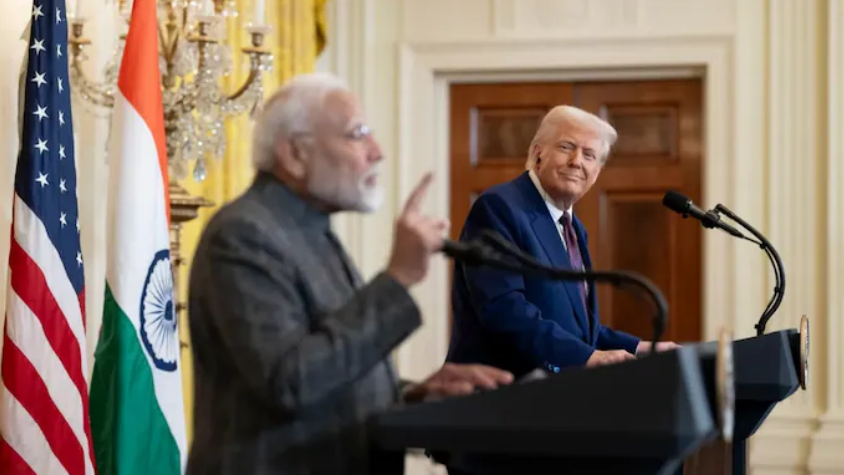
Former U.S. President Donald Trump has attempted to strike a conciliatory tone toward Prime Minister Narendra Modi after his recent remarks suggesting India had “lost to China” in trade. While Trump’s earlier comments created ripples in both Washington and New Delhi, his latest statement emphasizes his personal relationship with Modi, declaring that they will “always be friends.” The episode reflects Trump’s dual strategy of appealing to domestic constituencies while maintaining the image of strong international partnerships.
The Controversial Remark
Trump had earlier sparked controversy by criticizing India’s economic engagement with China. In a campaign rally, he claimed that India had allowed China to gain the upper hand in trade, undermining its own growth. The comments were seen as part of Trump’s broader effort to highlight his tough stance on China while painting rivals as weak on trade negotiations.
Indian officials and analysts reacted cautiously, noting that such remarks often emerge from U.S. domestic political calculations rather than bilateral policy shifts. The Modi government, aware of Trump’s history of sharp but fluctuating rhetoric, refrained from issuing an official response.
Reaffirming Personal Ties
Soon after, Trump recalibrated his message. In a media interaction, he described Prime Minister Modi as a “good man” and reiterated that they shared a strong friendship built over years of diplomatic engagements. Trump emphasized that despite political differences or campaign rhetoric, he values Modi as a “friend forever.”
This reassurance was not unexpected. Throughout his presidency, Trump cultivated a highly visible personal rapport with Modi. Their joint appearances — most memorably at the “Howdy Modi” rally in Houston and the “Namaste Trump” event in Ahmedabad — underscored their mutual political benefits from projecting warmth and camaraderie.
The Modi-Trump Relationship
The Modi-Trump relationship was unique in its blend of populist appeal, strategic convergence, and theatrical diplomacy. Both leaders leveraged their partnership to strengthen nationalist narratives at home. Modi gained from Trump’s endorsement of India’s rise as a global power, while Trump tapped into the influence of the Indian diaspora in key U.S. states.
At the policy level, the two administrations deepened defense cooperation, signed major arms deals, and advanced the Quad alliance involving Japan and Australia. However, trade disputes remained a recurring friction point, with Trump often criticizing India’s tariffs and market barriers.
Why Trump Softened His Tone
Trump’s decision to tone down his criticism is rooted in both political and diplomatic considerations. With the U.S. election season heating up, he is attempting to balance his tough-on-China message with reassurance that he can maintain strong ties with key allies. Alienating India, viewed as a critical partner in countering Beijing, would contradict his strategic narrative.
Moreover, the Indian-American community represents an influential voting bloc in states like Texas, New Jersey, and Florida. Trump’s campaign cannot afford to alienate this demographic by appearing hostile toward Modi, who enjoys significant popularity among Indian-origin voters.
India’s Trade and China Challenge
India’s trade relationship with China has been a complex one. Despite political tensions, bilateral trade volumes have surged in recent years, with India importing critical components, electronics, and raw materials. At the same time, New Delhi has made efforts to reduce its dependence on Chinese goods by promoting domestic manufacturing under the “Atmanirbhar Bharat” initiative.
Trump’s criticism reflects longstanding U.S. concerns about trade imbalances and China’s global economic dominance. However, India has positioned itself as a strategic counterweight to China, especially in defense and technology collaborations with the U.S. This makes Trump’s softened stance toward Modi not only politically convenient but also geopolitically necessary.
Impact on Bilateral Ties
Observers note that Trump’s rhetoric, while sharp, is unlikely to derail U.S.-India relations. The bipartisan consensus in Washington has consistently emphasized India’s role as a strategic partner. Even during periods of trade disputes, defense and security cooperation between the two nations remained strong.
For New Delhi, Trump’s remarks are viewed through the lens of American electoral politics rather than a fundamental policy shift. Indian officials remain cautious but optimistic, emphasizing continuity in U.S.-India ties regardless of campaign noise.
Strategic Outlook
As Trump repositions his message, the episode highlights the interplay between personal diplomacy and domestic politics. Modi and Trump’s rapport has been a defining feature of recent India-U.S. relations, serving as a bridge even during moments of policy divergence. Going forward, Trump is likely to continue invoking his friendship with Modi as a campaign asset while reserving criticism for China and trade issues.
